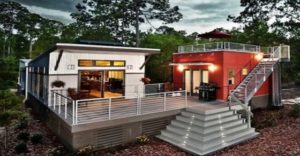 Believe it or not, it is illegal in some states to go off the grid! At a time when conservation, alternative energies, and being responsible is the thing to do. Some states are actually saying you must be attached to the electrical and water grid. We wonder why this is the case. The only reason we can think of is control of our private spaces. Also being able to monitor even if it is in a small way our activities. This will be an ongoing battle, however, in the meantime, there are more practical issues to think about when you go off the grid or are considering taking this approach. Many people will consider going off the electrical grid to save money or in some cases, there is no service provided in remote areas. We will explore some of the issues to consider in this post.
Believe it or not, it is illegal in some states to go off the grid! At a time when conservation, alternative energies, and being responsible is the thing to do. Some states are actually saying you must be attached to the electrical and water grid. We wonder why this is the case. The only reason we can think of is control of our private spaces. Also being able to monitor even if it is in a small way our activities. This will be an ongoing battle, however, in the meantime, there are more practical issues to think about when you go off the grid or are considering taking this approach. Many people will consider going off the electrical grid to save money or in some cases, there is no service provided in remote areas. We will explore some of the issues to consider in this post.
Issues to Think About When You Go off the Grid
Getting Started Cost – For many people, the initial upfront cost may be a show stopper. Obtain several quotes so that you fully understand what it will cost to have your system installed and become operational. Costs vary across the country, but numbers in the thirty to forty thousand range are not unreasonable.
Payback Time Frame – Once you know the get-started cost and have added the DC appliances cost you need to calculate the total cost and how long it will take to repay all of your costs from the savings in electrical costs. If it is more than 8 to 10 years, and your system will last 15 to 20, your risk is going up quickly. Look for the shortest payback period you can obtain.
Cost of Major Appliances – Appliances, such as your fridge is quite inexpensive if it operates on AC power. However, they can cost 3 times the normal cost if they run on DC power. You want DC because you lose a lot of power converting from DC to AC power.
Cost of Minor Appliances – Factor in the cost of small DC appliances such as toasters, lights, etc
Monitoring Energy Use
Once your system is installed, consumers should monitor the system to ensure that it is operating as advertised. How long do the batteries last, do they fully charge during the day and do you need to fully charge them once a month?
System Maintenance – Consumers will need to keep the solar panels clean, check the batteries and fully charge the batteries according to the instructions they receive from the company you purchased them from.
Heating Water and Cooking – Many consumers will use propane to heat water and cook to conserve electrical power and manage the overall cost of their system and appliances. You will need to purchase a propane stove, perhaps a propane water heater, and a propane furnace for heating.
This all works if your electricity rates are high since it drives the payback period to a smaller number. Do the math and make the right decision.